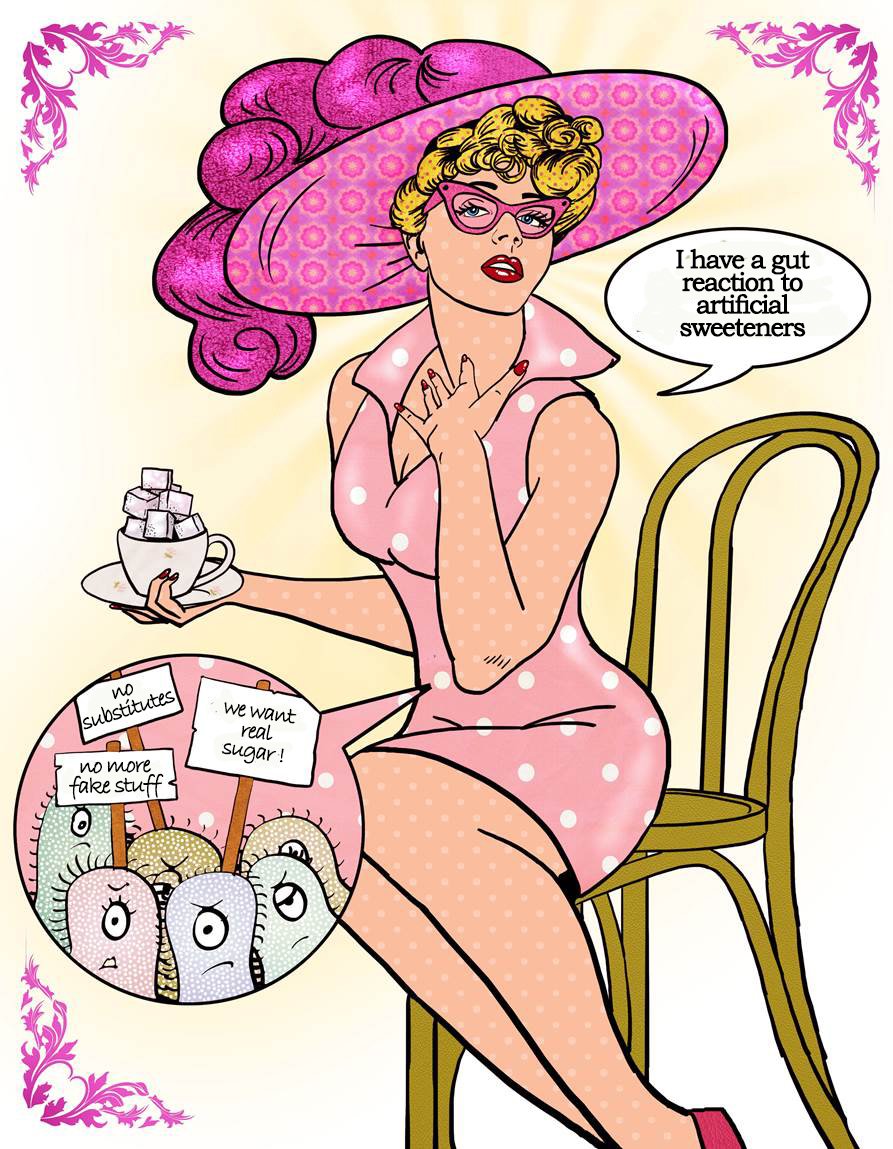Beware the Diet Coke!
Since the invention of diet soda by Kirsch Bottling in 1952, the sugar-free, artificially sweetened drinks have been marketed with diabetic and weight-conscious populations in mind. Yet new research from Israel finds that artificial sweeteners could actually hasten the development of the glucose intolerance, leading to diabetes and obesity.
The research, conducted by the Weizmann Institute of Science, found that the artificial sweeteners used to give diet sodas the same sweet taste as their sugar-packed counterparts actually alter the composition and function of bacteria in our gut. In turn, these changes in micro bacteria are what contribute to the development of glucose intolerance or obesity over time, conditions that consumers of diet sodas set out to avoid in the first place!

The only thing as sweet as sugar is, well, sugar
In order to examine their hypothesis, Dr. Eran Elinav and Prof. Eran Segal gave mice water laced with a limited amount of the three most commonly used artificial sweeteners. Over time, the mice developed glucose intolerance, or diabetes, when compared to those mice that drank plain water or even sugar water. Establishing the effect of artificial sweeteners on glucose levels, the team moved on to examine the gut micro bacteria hypothesis that they believed was responsible for the body’s sugar spike. Indeed, the team found that artificial sweeteners are not actually absorbed in the gastrointestinal tract and instead pass through the digestive system, altering the gut micro bacteria they encountered along the way.
SEE ALSO: New Research Can Tell You Your Susceptibility To Diabetes
Reversing not-so artificial damage
Moving on from mice to men, Elinav and Segal observed data collected by the Personalized Nutrition Project, the largest human trial to date to look at the connection between nutrition and micro bacteria. Analyzing the data, the researchers uncovered a correlation between the consumption of artificial sweeteners, the configuration of gut bacteria and the propensity for glucose intolerance. Then, they conducted a controlled experiment in which a group of volunteers, who did not generally eat or drink artificially flavored foods, asking them to consume artificial sweeteners for a week straight. The results showed that many (not all) of the volunteers began to develop glucose intolerance after just one week of steady artificial sweetener consumption. Looking closer at their gut micro bacteria, the researchers discovered two populations of human gut bacteria – one that induced glucose intolerance and another that failed to have an effect either way.
Sign up for our free weekly newsletter
SubscribeWith knowledge that one-fifth or more of Americans drink a diet soda daily and that such a large population is not likely to give up their drinking habits overnight, the Weizmann research team began to dig into ways of reversing the intestinal tract damage already caused by artificial sweeteners. The researchers achieved success in fully reversing the effect of the sweeteners by treating the suddenly diabetic mice with antibiotics that brought their gut micro bacteria back to normal. This was the conclusive proof for the team that the gut micro bacteria are directly responsible for the harmful effect’s on the host’s metabolism and glucose levels.
 SEE ALSO: Study Shows How Sitting On Your Butt ACTUALLY Makes It Fat!
SEE ALSO: Study Shows How Sitting On Your Butt ACTUALLY Makes It Fat!
“Our relationship with our own individual mix of gut bacteria is a huge factor in determining how the food we eat affects us. Especially intriguing is the link between use of artificial sweeteners – through the bacteria in our guts – to a tendency to develop the very disorders they were designed to prevent; this calls for reassessment of today’s massive, unsupervised consumption of these substances,” Dr. Elinav stated in a press release.
So before you crack open a can of diet soda for “health” or “diet” reasons, remember your gut bacteria!
The study was conducted by Dr. Eran Elinav of the Weizmann Institute’s Immunology Department, Prof. Eran Segal of the Computer Science and Applied Mathematics Department along with graduate students in each of their study groups.
Photos: fashiontalenet/ Rob Campbell/ courtesy
Related posts

Israeli Medical Technologies That Could Change The World

Harnessing Our Own Bodies For Side Effect-Free Weight Loss

Missing Protein Could Unlock Treatment For Aggressive Lung Cancer




Facebook comments